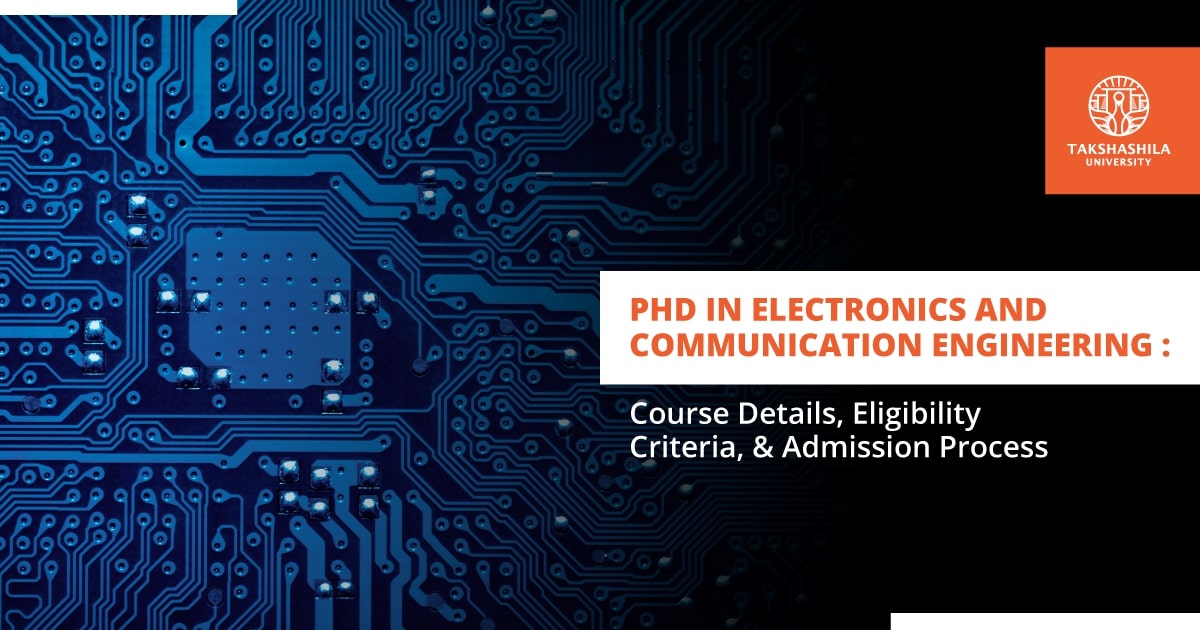Introduction
Pursuing a PhD in Electronics and Communication Engineering (ECE) means a great deal of intensive study practice with an active approach to research about the changing scope of electronic devices and communication systems.
This program is best suited for people who intend to develop groundbreaking strategies to solve existing problems in the sectors of telecommunication, signal processing, embedded systems, etc.
This article explains the course details, eligibility, admission process, skill advancement, finances, and employment opportunities available for PhD in ECE holders.

Who Can Do a PhD in Electronics and Communication Engineering (ECE)?
A PhD in Electronics and Communication Engineering (ECE) suits individuals with a solid academic background and a keen interest in advancing technology and research. Generally, recruitment candidates for this post should hold a Master’s degree in ECE or a related field, such as Electrical Engineering, with a minimum aggregate score of 60% or an equivalent cumulative grade point average. Candidates must complete the GATE, UGC NET test, or any university’s PhD entrance tests, ensuring that minimum basic concepts are clear.
Furthermore, quality research experience, evidenced by the candidate’s participation in research articles, journal or conference proceedings or relevant work experience, remains a unique strength. This programme is especially suitable for students keen to discover new horizons in electronics and communication and to create new trends in wireless communications systems and electronic devices, micro and nanoelectronics, and signal processing.
Research skills are highly valued since PhD candidates are expected to carry out their own research projects, which may involve partnerships with industrial organisations, universities, other research institutions, and government research laboratories. Common traits include enhanced critical thinking, problem-solving, and the ability to work independently on a project.
The development of such applications as complex and multifunctional communication systems, IoT apparatuses, and intelligent technologies proves the relevance of this area. According to a report from MarketsandMarkets, this is set to reach USD 561.04 billion in the 2025 global IoT market, making the demand for researchers in ECE even more valuable. Therefore, the intended audience of this segment will consist of academicians who want to achieve technological developments in their respective countries.
Course Overview:
PhD in Electronics and Communication Engineering. What is more interesting is that the PhD in ECE covers a diverse area of specialisation, which includes, but is not limited to, communication systems and networks, wireless communications, digital image processing, and VLSI Design.
Core Components:
- Research Methodology: Gain insights into research methods, data collection, and statistical analysis relevant to ECE.
- Literature Review: Conduct comprehensive reviews of existing research to identify gaps and define your research objectives.
- Dissertation Work: Conduct original research that contributes new knowledge to the field, culminating in a doctoral dissertation.
- Seminars and Workshops: Participate in academic conferences to present findings and collaborate with peers.
Areas of Specialization:
- Wireless Communication: Explore emerging technologies in mobile and wireless communication systems.
- Embedded Systems: Investigate hardware-software co-design, real-time systems, and IoT applications.
- Signal Processing: Study techniques for analysing, modifying, and synthesising signals.
- Microelectronics: Focus on semiconductor devices, integrated circuits, and fabrication processes.
Skill Enhancement:
Beyond the Curriculum, However, to develop research skills, it is recommended that students partake in several improvement activities:
Certifications:
- Certified Wireless Network Administrator CWNA: A certification that appraises wireless networking knowledge.
- Embedded Systems Certification: A certification which aims to improve one’s embedded system development & design knowledge.
- Data Science Certifications: Suitable certifications in areas that would enhance contribution to data in communication technology.
Workshops and Seminars:
- Participate in conferences in the ECE field for professional interaction and effective presentation of one’s research papers.
- Join cross-disciplinary workshops that promote the spirit of working across disciplines.
Research Experience:
- Collaborative Projects: Engage in faculty’s research activities to assist in learning from practice.
- Teaching Assistantships: Instruct undergraduate students and enhance their communication skills.
Eligibility Criteria
To be considered for the PhD programme in ECE, the candidates have specific academic and admission standards below which they will not be considered for admission:
Academic Qualification:
A Master’s Degree in Electronics and Communication Engineering or a related discipline.
Minimum Marks:
In fact, most candidates are expected to have a nett aggregate of not less than 55% or the equivalent CGPA at the master’s degree level.
Entrance Exams:
Candidates seeking admission may be required to pass a relevant national examination (like GATE or GRE) or a conducted examination.
Research Proposal:
All applicants must provide a statement of purpose indicating the area of research they intend to pursue.
Admission Process
Several stages are involved in the admission process for a PhD in Electronics and Communication Engineering:
- Submission of Application: You Should complete an online application form and attach the required documents, including academic records and a research proposal.
- Entrance Exam: The candidate should sit for the necessary entrance exam and attain the cutoff score.
- Interview Process: Selected applicants will be invited to interview with the admissions committee.
- Final Selection: Candidates get admission offers after completing the steps stated above.
Financial Considerations and ROI
It is also essential for students pursuing a PhD to understand the costs involved in doing so.
Cost of Education
Tuition Fees
The annual average amount to pay for the program PhD in ECE ranges on the low side of INR 1,00,000 to 2,00,000.
Additional Costs
Additional costs, such as research materials and living expenses, are expected to be between INR 20,000 and 50,000 annually.
Potential Earnings:
| Role | Average Salary (INR) |
| Research Scientist | 10,00,000 – 25,00,000 |
| University Professor | 12,00,000 – 30,00,000 |
| Embedded Systems Engineer | 8,00,000 – 20,00,000 |
| Telecommunications Engineer | 9,00,000 – 22,00,000 |
Return on Investment (ROI):
The ROI is relatively high when one pursues PhD in ECE since there is a growing need for those engaged in research and those with advanced technology strategies for the market. The graduates will be ready for well-paying and available positions in academia and industry.
How will a PhD in Electronics and Communication Engineering (ECE) career and salary be in India?
A PhD in Electronics and Communication Engineering (ECE) opens up many career opportunities in India, spanning academia, industry, and research organisations. Professionally, PhD holders have opportunities to work as professors, lecturers, and academic researchers in various higher institutions to contribute to the development of education and introduce innovations in the field of research. The UGC in India states that first-year aides are compensated INR 57,700 to INR 79,800 as monthly wages for working as assistant professors.
In the industrial sector, the applications PhD holders in IGNOU can find employment opportunities, for example, Research Development engineers, systems architects and technical consultants in IT giants like TCS, Infosys, Wipro and multinational companies like Intel, Qualcomm and Samsung. The compensation research platform Payscale places the average basic pay for an R&D engineer in India at INR 850000 annually, with higher-ranking positions earning much more.
Indian research centres and Government bodies like DRDO, ISRO, and CSIR provide some of the best jobs for PhD holders in advanced communication systems, satellite technology, and defence sectors. Initiatives of the Indian government, such as Digital India and Smart Cities, naturally enhance the requirement for professionals in ECE with proper funding and research grants.
Furthermore, the emerging startup environment in India has potential for startup activity in the context of IoT, telecommunications AI, and communication technologies. News technologies like 5G and smart devices are also increasing the need for skilled professionals, making ECE an exciting sector.
Overall, a PhD in ECE offers a lucrative career with an enhanced paid scale and places human resources at the cutting edge to come up with technological breakthroughs that may go a long way in writing India’s success story in the rapidly advancing world technology map.
Make the Right Decision – Join Takshashila University! Join Takshashila University to Embrace the Future!
Are you ready to pursue further studies? Takshashila University’s PhD in Electronics and Communication Engineering program offers good research opportunities. Our education is complete due to our professional staff and advanced facilities.
Save time and submit your application to become one of the fellows of the community of scholars.
Conclusion
The PhD in Electronics and Communication Engineering brings forward the unique ability to fully engage in adequate research and help extend the boundaries of the growing profession.
The integration of the different components of the program with the practical exposure equips most students to deal with multifaceted problems and innovate in different industries.
The time for ECE research at Takshashila University is now!
FAQ
1. What are the eligibility criteria for pursuing a PhD in Electronics and Communication Engineering?
To be eligible for a PhD in Electronics and Communication Engineering, candidates typically need a master’s degree in Electronics, Communication, Electrical Engineering, or a related field. Institution: Some institutions also accept candidates with a BTech or BE degree in the particular field if the candidate has a good academic record and research background. Further, most universities demand that applicants clear national-level tests such as GATE or UGC NET.
2. Can candidates seeking admission into the PhD programme in Electronics and Communication Engineering state how they will be admitted?
There are also standard features of the admission procedure, which usually has several stages. The application process involves filling out a form and providing curriculum vitae, academic transcripts and research proposal. Some universities also require the candidate to sit for an interview or a written exam to test the candidate’s research ability. Based on compiled records of academic achievements, entrance assessments, and interviews, courses are offered to successful candidates afterwards.
3. What topics can be pursued in research for a PhD in Electronics and Communication Engineering?
Therefore, specialisations for research in this domain are diverse; they may include wireless communication and networking, signal processing, embedded systems and hardware, semiconductor and integrated circuit design, and computer and network security. The author recommends that candidates match the specific subject of their research endeavours to the field of specialisation of the faculties as well as emerging trends in the marketplace to ensure that they come up with valuable research.
4. How long does completing a PhD in Electronics and Communication Engineering take?
It takes between 3 and 5 years for students to complete a PhD depending on the university, the research proposal and the completion rate. Some students may take longer if, for instance, their work involves many experiments or if they are working at the same time.
5. What career opportunities are available after completing a PhD in Electronics and Communication Engineering?
After completing the PhD programme in Electronics and Communication Engineering, the above-summarised career options are available. Most of them may engage in teaching or research in universities or colleges, the telecommunications or aerospace industry, electronics manufacturing industries, or government research bodies. They can be generic, like research scientist, senior engineer, or technology consultant, which generally are associated with pretty good salaries and further promotion offers.






